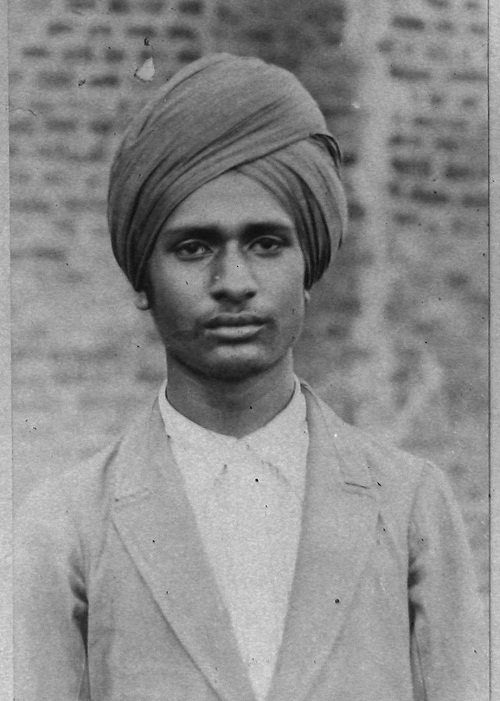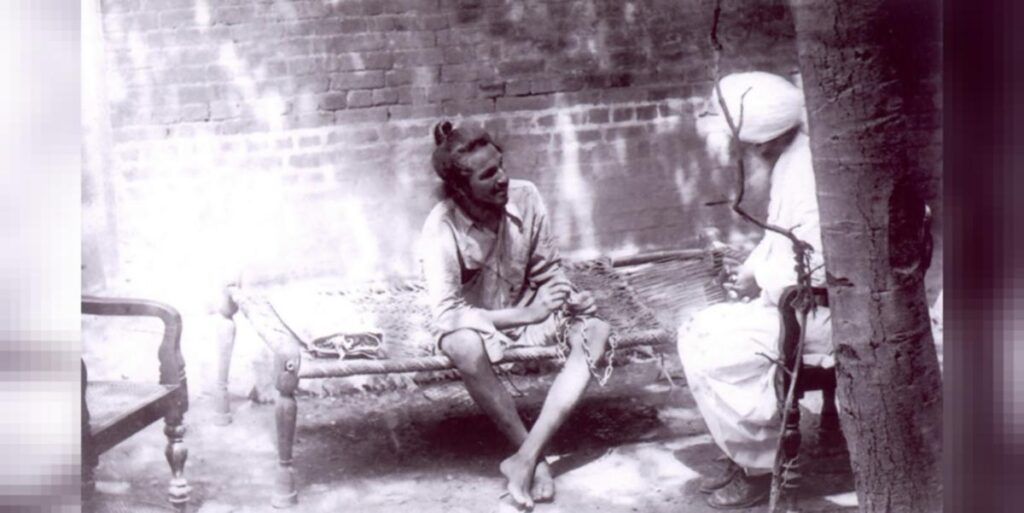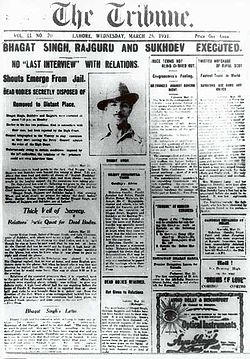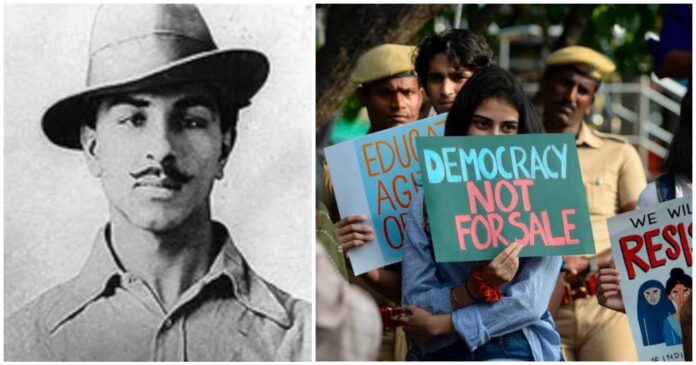Bhagat Singh was a youth leader in two senses of the term. First, he was a young revolutionary, who was active from his young days. When he was born, his family was already deep in the revolutionary struggle. His uncle, Ajit Singh was forced into exile in Latin America for his activities, and only returned in 1947. He visited Jallianwalla Bagh at age 12. He began writing on revolutionary topics from age 15. By age 17, he worked in mass organizing. He soon joined the Hindustan Republican Socialist Association (HSRA) and worked for the revolution until his death at age of 24, when he was hanged by the state.

Early in his life, Bhagat Singh encouraged the youth to get involved in politics. He was critical of political leaders and teachers who discouraged the youth from getting involved in politics, calling them failures as leaders and educators. He remarked that the youth would get no direction from such leaders, and no real wisdom from such teachers.
Bhagat Singh also had a deep faith in the youth as revolutionary agents in society. He felt that society would only progress with the deep and persistent engagement of the youth. Bhagat Singh did not want the youth to be passive spectators in revolutionary activity. He wrote that the youth of today were the countrymen of tomorrow. Only when they revolutionize society through hard work and sacrifice, will the society move towards the global revolution. The youth have energy and enthusiasm, as inheritors of society, they were in the right position to make real change.
Also read: Journalists Have a Lot to Learn From Bhagat Singh
Bhagat Singh’s Revolutionary Vision
Though he was a nationalist, Bhagat Singh had a global vision. His vision was a world where love was universal. From age 17, Bhagat Singh began writing about the need for a global revolution. He believed that only through Universal love, where everyone in the world was part of a single loving family, would the revolution be complete. In such a world, there would be no more hunger, no more war, and no divisions within humanity. He felt nationalism was important in the struggle against imperialism, but he was critical of nationalists who wanted to transfer control from white-skinned capitalists to brown-skinned capitalists. As he said, to the worker, there was no difference between the two, and the worker should have no incentive to support domestic exploiters over global thieves.
Bhagat Singh criticized the state for being just a tool for capitalism. The bureaucracy kept the masses out of the state and made the state illegitimate. To get the support of the masses, one had to fight for the masses and create a true People’s state. A People’s state would require three conditions:
- Responsibility is with the people.
- The Masses actively participate in the state.
- Safeguards are in place to ensure this remains.

Also read: Martyrdom Day of Bhagat Singh, Shivram Rajguru and Sukhdev Thapar at Delhi Borders
How the Youth can change the world
Bhagat Singh encouraged the youth to get involved in politics, but he had qualifications. If anyone got involved in politics, they would inevitably be forced into compromises. What would distinguish someone who compromised with the oppressors, from the oppressors themselves? It would depend on how they engaged with the struggles of the masses. Traitors would be quiet and subservient to the state and its authorities. Bhagat Singh insisted that authentic revolutionaries would be open with the masses. They would not call for partnership, but a deepening of democracy.
Bhagat Singh appreciated that compromises would be an opportunity to engage the masses, by exposing the conditions of compromise. When engaging with the masses, the revolutionary would have to expose the power behind decisions and call upon the masses for support. By being open with the masses in their positions and expressing their dissent openly, those who work in political agitation would bring the masses into the decision-making process and further the cause of a People’s state. All revolutionary activity would be evaluated by how it brought about the conditions for creating a People’s state.
If those who run the state restricted dissent and tried to control those involved in politics, this could only be countered by active struggle.

Ideally, this would be a mass struggle, and all efforts should work towards building an actively political mass. In this way, he appreciated the Gandhian approach. He felt it was able to excite the masses, though he also felt that partnership between the oppressors and oppressed was a dead-end road. Gandhi’s approach depended on a partnership between the oppressors and oppressed. Without challenging that relationship, the Gandhian approach retained those divisions and would not change society.
When calling the youth towards the revolutionary struggle, Bhagat Singh wanted people to be mindful of what stage of struggle society was in. He studied many revolutionary struggles across the world and felt that India was ready for a revolution. His words should be understood in his time. Likewise, his lessons would be applied differently in today’s context. He insisted on taking up militancy if the doors to the state were closed. If the doors were open as an act of appeasement, the struggle should be of open dissent, exposing the relationships of power. If the masses could take direct control, the people should take up responsibility.
Bhagat Singh died with full faith in the masses. In eulogizing Bhagat Singh, many nationalists and historians have speculated what would have happened to this young leader has he lived. It is important to remember that his death and sacrifice for the country were part of his revolutionary philosophy. He felt that, without being brash and needlessly adventuristic, the young must make sacrifices today to build a better society. He felt that openly and honestly confronting the powerful about injustices would lead to repercussions to the youth. He felt that compromises were never to be made silently. He also had a vision of what a revolutionary world would look like. His sacrifice was meant to be an inspiration to others to work for this global revolution of peace, love, and humanity.
The author is a mathematician based in Bangalore. Views expressed are personal.




[…] After World War I, Italy’s economy was ruined. Though a victor in the war, Italy did not secure the same gains that Britain and France did. The global economy was already very weak. Labour Strikes and peasant agitation were on the rise. As in most parts of Europe, the elite feared the rising revolutionary movements. These movements also had a long radical history, inspiring revolutionaries across the world, including Bhagat Singh in India. […]